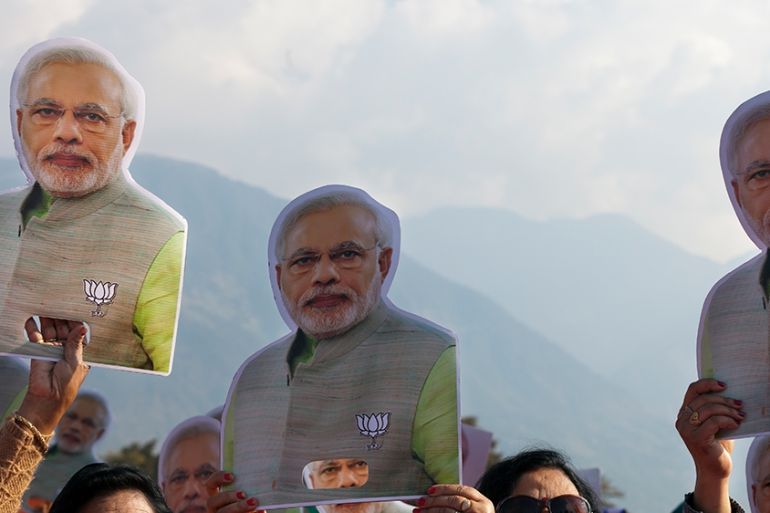India plans job quotas for upper caste poor as election nears
BJP moves constitution amendment bill in parliament to reserve 10 percent of government jobs for the privileged group.

New Delhi, India – Months ahead of crucial general elections, India‘s government plans to reserve 10 percent of government jobs for the poor, including the country’s historically privileged upper castes.
The Bharatiya Janata Party-led (BJP-led) government on Tuesday moved a constitution amendment bill in the lower house of parliament, seeking an increase in the cap on reservations from 50 percent to 60 percent.
Keep reading
list of 4 itemsIndia votes in first phase of marathon election as Modi seeks third term
The Take: What would a third Modi term mean for India?
Can Sunil Kanugolu bring India’s Modi down, 10 years after helping him win?
India’s system of reservation or quota – its version of affirmative action – guarantees the historically-disadvantaged lower castes and tribes “reserved” places in government jobs, educational institutions and even seats in parliament and state assemblies.
The amendment bill must be backed by a two-thirds majority in both the houses of parliament.
The government does not have a majority in the upper house, although it is not immediately clear how rival political parties would vote on the bill.
The new reservation policy, if it comes into effect, would aid households with an annual income of less than $11,000, the Press Trust of India news agency reported.
In 2017, India’s average income was $1,939, according to the World Bank.
In any case, this income bracket would include the Indian upper middle class, which makes the proposal doubly ridiculous.
‘Appeasement of upper castes’
Critics say steps like these are precursors to doing away with caste-based reservations, a system long detested by India’s upper castes, who say the programme deprives them of opportunities.
They want the government to revise existing affirmative action policies that favour low-caste Hindus and Other Backward Classes – a collective term covering socially and educationally deprived groups.
They are actually trying to dilute the concept of reservation itself, says senior journalist Dilip Mandal, who tracks caste politics in India.
“What the government is doing now is appeasement of the upper castes, who are already over-represented in bureaucracy, judiciary, media and echelons of corporate power,” Mandal told Al Jazeera.
“This is not meant to be a poverty alleviation programme. For that, we have other relief measures in place. Reservations were meant to give representation to all social groups, especially those historically marginalised, in nation-making. Upper castes are not historically deprived,” he added.
Hindus are traditionally grouped into various castes and membership is determined by birth. In many Indian villages, lower castes like Dalits usually till land owned by higher castes but live separately, often forbidden to share the village’s well or cemetery.
India’s lower castes, especially the Dalits, face continued social discrimination and even untouchability, despite the practice being outlawed by parliament in 1955.
Growing demand for quotas
A 1992 judgement of India’s Supreme Court held that “any reservation beyond 50 percent would liable to be struck down”.
“[The bill] would not withstand judicial scrutiny. Reservations can’t be a poverty alleviation programme. They exist to remedy historical discrimination on the basis of caste, for instance. In any case, this income bracket would include the Indian upper middle class, which makes the proposal doubly ridiculous,” Supreme Court lawyer Karuna Nundy told Al Jazeera.
“This move is a mercenary tactic to divert anger from [Prime Minister Narendra] Modi and instead pit different groups against each other to fight afresh over reservations.”
In recent years, millions of members of other communities have rallied to demand changes to this policy that, they argue, unfairly favour groups at the lower end of India’s social order.
“There is a need for a wider debate on whether economic criteria should also be included while reserving government jobs. Parliament needs to discuss this threadbare,” Desh Ratan Nigam, a member of the Rashtriya Swayamsevak Sangh (RSS), the ideological parent body of the ruling BJP, told Al Jazeera.
Poverty does not see caste.
“There are sections in the other 50 percent which are poor. The government has decided that there should be criteria totally focussed on poverty and not caste, creed or religion. Poverty does not see caste.”
Rising unemployment and rural distress are also spurring farming communities across India to redouble their calls for reservations in jobs and education.
Government jobs in India are highly sought after. India’s railway network recently received 19 million applications for 63,000 jobs as cleaners and track maintainers.
The move is also emblematic of the fortuitous arrangement of votes from different caste members and tactical alliances during an election season in India.
“Modi government’s 10 percent reservations for upper castes is a lollipop to appease voters,” tweeted Jignesh Mevani, an independent Dalit legislator from the western state of Gujarat.
Modi govt’s 10% reservation for upper castes is a lollipop to appease voters.#Reservation #UpperCasteQuota
Please watch my full interview – https://t.co/K1XXI1ZtVm— Jignesh Mevani (@jigneshmevani80) January 8, 2019
Prime Minister Narendra Modi said in a recent interview that the ruling BJP is confident of doing well in this year’s general elections despite the party’s recent losses in state polls.
Although Hindu nationalist Modi remains popular, the 2019 election is slated to be a tough battle, with some voters feeling let down by his inability to create jobs and battle rural distress.
With moves like changes in the reservations policy, the BJP is seeking to propel Modi to a second term in this year’s general elections, due to be held by May.